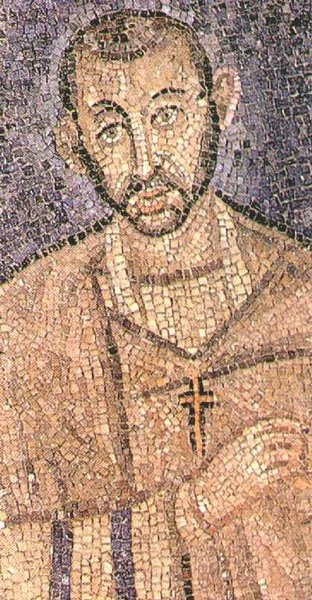JOHN 21:1-19
THE RISEN LORD WANTS
HIS SHEEP FED.
M: Alleluia! Christ is risen!
Cong: He is risen indeed! Alleluia!
In the name + of Jesus.
In the upper room on the night Jesus was betrayed, the apostles got into a debate about which of them was the greatest. Perhaps it was in conjunction with Jesus telling them that he was about to die. If Jesus were no longer the leader, which one of the apostles was greatest and, therefore, would assume his mantle and be the next rabbi for their group? Obviously, none of them was the greatest. None of them was even good. They all abandoned Jesus. Peter made a strong case for being the worst of the Twelve, denying Jesus three times and renouncing him.
Jesus had appeared to these faulty men twice already. Jesus' appearances proved that their flesh-and-blood Savior who died was still their flesh-and-blood Jesus. Only now, the body which had been crucified and buried was alive. Jesus Christ is risen! And Jesus was not angry with them because of their sins. He declared peace to them so that they would not be afraid. He absolved them so that they would not be plagued with guilt or sorrow. The apostles rejoiced at the sight of Jesus. Jesus lives, and sins are forgiven.
After those two appearances by Jesus, they went back up north to Galilee, to their homeland. Jesus had told them to go there. But the apostles seemed to be at somewhat of a loss of what to do next. So, they went back to what they knew.
Simon Peter said to them, “I am going fishing.” They said to him, “We will go with you.” They went out and got into the boat, but that night they caught nothing. (John 21:3)
In the first light of the day, Jesus appeared on the shore. He instructed the fishermen to cast their net on the right side of the boat, and he assured them they would find fish there. The disciples pulled in an extraordinary number of fish in their net—way more than they needed for their next meal. It would be enough to sell in the marketplace feed their families for days.
It was all too familiar to John.
That disciple … said to Peter, “It is the Lord!” (John 21:7) These fishermen had witnessed Jesus do this same miracle some three years prior. Immediately after that miracle, Jesus called these men to leave their nets, to be his full-time disciples, and to train for the ministry. Just as Jesus repeated that miracle, so Jesus repeated that call. Jesus' resurrection did not mean that the disciples no longer had anything to do. The risen Lord wants his sheep fed.
After Jesus had feasted with his disciples, he spoke to Peter. Three times, Jesus asked Peter, “Do you love me?” It was as if Jesus were undoing Peter's three denials and reinstating Peter as a
bona fide apostle. But Jesus' first question to Peter deserves more attention. Jesus said to Simon Peter,
“Simon, son of John, do you love me more than these?” (John 21:15) The question is “these” what?
“Do you love me more than these other apostles?” This seems unlikely. Jesus had rebuked the disciples for boasting about who was greater than whom. We don't have contests in this church about who is the greatest Christian. There are no awards ceremonies for who has the strongest faith or who has done the best works. Such contests would not only be worthless, they would be destructive. Even when we have such contests in our heads, we insult fellow Christians. If anyone would dare to make such boasts, people would not be concerned if that person fell into sin. They would cheer to see him fall from his perch and would take sinful pleasure in his humiliation. Our place in God's kingdom has nothing to do with how great we are, how strong our faith is, or how much we do. It has everything to do with how much Jesus loves us. Our place God's kingdom is only ours because Jesus had done all the work to bring us into it. Therefore, there is no room in the kingdom of God for exalting oneself—whether taking pride that I am better than you, or rejoicing that I not as bad as you.
What seems more likely is that Jesus asked Peter,
“Simon, son of John, do you love me more than these fish?” Remember, Peter and the others had hauled in 153 large fish. That was a lucrative day on the Sea of Galilee. Is this what Simon would come back to when things got hard? Is this what Simon would revert to when he struggled, when he failed, or when he felt utterly defeated?
We all have places where we tend to flee to when life gets hard or sad or disappointing. Some medicate themselves with alcohol. Others bury themselves in their work. Some just shut out everyone else. This is how people deal with grief or guilt, heartache or hardship. When you feel like you have been a failure as a Christian, you may be tempted to quit because you do not measure up to what you think other people think of you. But this is precisely why the risen Lord wants his sheep fed. Jesus Christ knows that we are weak, and he knows that we still sin against him. While Jesus urges us to repent, to flee from sin, and to pursue what is holy, he also knows that we will fall short. Sometimes our sins will be sorely disappointing—both to ourselves and to others.
But the risen Lord wants his sheep fed. That began with Peter. Jesus did not tell Peter that he was too great a source of shame upon the Lord and, therefore, was no longer worthy of being Jesus' disciple. We are not judged based on our merits, but on Jesus' merits. Though we strive to be faithful, we are not graded by God on how faithful we have been. We would never know if we have been faithful enough, and we would be back to contests about which of us is the greatest and who is more faithful than whom. Instead, our comfort is that God is faithful to his promises, and that Jesus has been faithful for us in fulfilling all of God's promises to forgive sinners. And so Jesus called Peter, with all his faults and weaknesses, to go and feed his sheep. The risen Lord wants his flock to be tended with words of mercy, compassion, consolation, and encouragement. None of us is perfect. But we have a Savior whose love for us is perfect, whose sacrifice for us is perfect, and whose faithfulness to us is perfect. That perfect love sustains us through all of our imperfections.
It had not been much before this time that Peter had boasted of his greatness. He was full of himself, thinking that he would go brilliantly to a glorious death in defending Jesus against his enemies. Obviously, it did not work out that way. Gethsemane was not a glorious moment for Peter. Likewise, we may be guilty of having made great boasts about all the good we were going to do for God, only to have our boasts and our plans result in an inglorious failure. But Jesus told Peter,
“Truly, truly, I say to you, when you were young, you used to dress yourself and walk wherever you wanted, but when you are old, you will stretch out your hands, and another will dress you and carry you where you do not want to go.” (This he said to show by what kind of death he was to glorify God.) (John 21:18-19) In other words, Peter would get his wish after all. He would die for Jesus. But Peter's death would not be a mark of shame, even if it were gruesome. God would be glorified by Peter's service in feeding his sheep and in dying for Christ's name. In the same way, the Lord is honored by your service in his name, no matter what it is, even if it seems trivial or thankless. You do not have die a martyr's death to honor Jesus. All your works honor Jesus. For, even though your works are done in weakness and remain imperfect, the blood of Jesus cleanses them and makes them good and glorious to your Father in heaven—just as the blood of Jesus makes
you good and glorious to your Father in heaven.
But no matter what you do, your greatest work is being fed by our Lord Jesus Christ. It is he who loves us and sustains you in the Christian faith—delivering you from all your sins and consoling you with his faithful promises. This is your glory, and this is what makes God glorious—that God loves and saves sinners.
In the name of the Father and of the Son + and of the Holy Spirit. Amen.



















